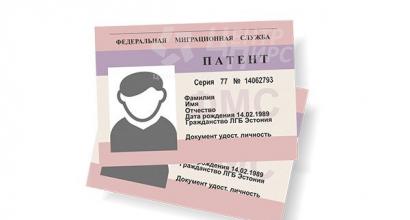How to hire a refugee: design features and legal framework
Today, the problem of employment of refugees is more relevant than ever. Many enterprises would gladly accept dozens, and even hundreds, of additional workers, but they do not always understand how to apply for a job as a refugee. On the one hand, to hire a foreign citizen, a special permit is required, on the other hand, refugees-migrants with a special status and by law have the right to work for hire, engage in entrepreneurial activities on an equal basis with citizens of the Russian Federation.
However, the difficulties are that for several months these persons may be in a "suspended" state - in an uncertain legal status, respectively, and it is problematic for them to find a job at this time. New law N 127-FZ of 05.05. 2014, amending the law No. 115-FZ on foreign citizens, is designed to simplify the procedure for legalizing refugees as much as possible. The adoption of this law, the introduction of accelerated obtaining of refugee status and citizenship are caused by a difficult foreign policy situation and an unprecedented influx of internally displaced persons from the southeastern regions of "square" Ukraine. Accordingly, for many Russian employers in 2014, the question arose of how to hire a refugee from Ukraine.
Grounds for the stay of refugees on the territory of the Russian Federation
The procedure for employment of a migrant depends on the legal grounds on which he is in the territory of the Russian Federation. Traditionally, all foreign citizens from neighboring states who crossed the border of our country due to the difficult humanitarian situation in their homeland are called refugees. However, this is not entirely true.
To recognize a foreigner as a refugee, he must go through the established bureaucratic procedure, which takes some time, usually 3-6 months. In addition, not all migrants strive to "legalise", hoping to "sit out" the difficult time with relatives or in temporary accommodation centers, and return to their native lands as soon as possible.
Thus, a foreign citizen who fled to us from his country may be in the following statuses:
- applied for refugee status;
- recognized as a refugee;
- received temporary asylum.
How do these statuses differ and how do they affect the order of employment? Arriving on the territory of Russia, the migrant must decide in what capacity he plans to be here. You can temporarily stay in the country for 90 days on a migration card, and then you need to either leave the country or submit documents to the FMS to obtain one or another status.
As for Ukrainian citizens, many of them choose the option of temporary stay, counting on a speedy return home. In this case, it is impossible to find a legal job without a special permit, and having received a “go-ahead” for employment from the migration services and having concluded an employment contract with the employer, the migration card can be extended for a year.

Those who plan to stay and finally settle in Russia try to apply to the migration authorities as early as possible in order to obtain official status and the corresponding rights. Thus, refugee status makes it possible to go to work without any additional permits and quotas, to have social benefits and a pension from the state.
Getting temporary asylum instead of refugee status is a good option for those who do not plan to stay in Russia for a long time. In this case, the migrant submits his passport to the migration service in exchange for a certificate of a temporary resident in the territory of the Russian Federation, which gives him the right to freely find a job and, if necessary, receive medical assistance. Such a permit is usually issued for a year, but if circumstances do not allow the foreigner to return to their homeland, temporary asylum can be extended.
Employment conditions for refugees and internally displaced persons
It is easiest for an employer to hire an employee with refugee status. Refugee "crusts" give the same rights in employment as any Russian citizen. The exception is vacancies that a foreigner cannot occupy under Law N 115-FZ “On the Legal Status of Foreign Citizens in the Russian Federation” (Article 14). These include:
- work at strategic military enterprises;
- military, state or municipal service;
- positions and organizations related to state secrets and security.
The problem of how to hire a refugee who has received temporary or political asylum is solved in a similar way: such migrants do not need permission to draw up an employment contract with a legal or private person. At the same time, the employer does not have to notify the migration service, the employment center and the Federal Tax Service of the arrival of such an employee at the enterprise.
But there is one nuance here - all these opportunities are provided to the migrant only when he officially acquires the status of a refugee. The fastest way to get it is when crossing the border in the migration card, put a mark in the column "purpose of visit" - a refugee, and upon arrival on Russian territory, immediately contact the citizenship department of the Federal Migration Service.
Papers that you need to have with you: passport, birth certificates of children, additional documents confirming education, work experience, etc. It is desirable that all documents be translated into Russian. In addition, the application procedure includes photographing and fingerprinting.
Due to the massive influx of applicants, the migration services are overcrowded with migrants, but it’s still worth “bumping around” in line and submitting an application, because the official status of a refugee gives a lot of advantages:
- provision of temporary housing;
- provision of medical care in the volumes provided for by compulsory medical insurance;
- the possibility of free employment or self-employment;
- assistance in employment and retraining;
- social security like the citizens of the Russian Federation;
- the right to obtain a residence permit and Russian citizenship in a simplified manner.
The catch is that after filing an application, you can wait for a refugee passport for a long time, and at this time you need to live on something. This is where the problem arises with the search and official employment.

Employment options for refugees without status
What employment options can an internally displaced person consider?
- Obtain a work permit (for employment with a legal entity and an individual entrepreneur) or a patent (for legal employment with a private person), for which you should contact the migration service. Lack of documents permitting work on the territory of the Russian Federation is punishable by a fine of 2–5 thousand rubles. and deportation out of the country.
- Get a temporary residence permit for up to 3 years. This status is assigned by the Federal Migration Service to a foreign citizen upon his application, if there are free quotas at the place of application of the migrant, issued to different regions, depending on the demographic and economic situation in the subject of the Federation. The presence of a temporary residence permit gives the right to employment without obtaining a work permit.
- Russian-speaking citizens living in the post-Soviet space may not apply for asylum, but apply for participation in the program for the resettlement of compatriots. This program provides for a number of benefits and allowances, assistance in resettlement in the selected region and assistance in finding employment. In the shortest possible time (up to 3 months), such a refugee receives Russian citizenship, and with it all rights in full.
- Since June 2014, the procedure for obtaining citizenship for refugees who are native speakers of the Russian language has been simplified. To do this, you do not need to live in Russia for 5 years, but you need to give up the passport of the former homeland, prove that during the Soviet era the family lived on its territory and pass an exam in Russian.
Employment of refugees without status
The host country, as a rule, creates normal conditions for life for people who have fled from their country to their neighbors: they provide a roof over their heads, provide food, clothing and other necessary benefits. However, many prefer not to sit idly by and depend on the state that sheltered them, but from the first day they are looking for opportunities to independently support themselves and their families. Moreover, the soonest employment will help internally displaced persons quickly adapt to a new society, in unusual conditions.
What are the actions of a potential employer in this case, how can he hire a refugee from Ukraine and any other country, if the legal status of this person has not yet been determined?
In such a situation, it is necessary to follow the procedure provided for employment of foreign citizens:
1. An organization or an individual entrepreneur cannot employ migrants without having a special permit for this. To begin with, the employer should contact the local employment center, justify the need for foreign labor and obtain a conclusion for a period of 1 year. With this document, go to law enforcement agencies, additionally filling out:
- statement;
- a draft labor contract with a potential foreign worker;
- data of migrant applicants in writing;
- copies of registration and constituent documents of the organization.
If the law enforcement authorities have no claims to the documents and grounds for refusal, then a permit is issued for each of the accepted foreign workers. With the received document, the future employee must be familiarized with the signature.
2. A candidate for employment must have a work permit, which he independently obtains from the FMS by submitting an application and attaching a passport (with a notarized translation), a migration card with a border crossing mark and 2 photographs. Before submitting an application, you will need to undergo a medical examination for drug addiction, infectious diseases and HIV status, and present the certificate to the migration officers. A fee is also charged for issuing a permit. A plastic card that gives the right to employment in a particular region is valid for 1 year. To work with an individual, it is enough to issue a patent for 1-3 months - it does not require a medical examination.
The employer can take over the issuance of a permit for a forced migrant, but upon dismissal of such an employee, he must notify the migration service, that is, the right to work in this case, the person will lose and will be forced to issue it again.
3. A standard employment contract is concluded with the employee. To do this, a refugee presents a passport, a diploma of education, a work book, if he has previously worked for Russian employers.
The legitimacy of the potential employee's presence in the territory of the Russian Federation is necessarily checked. He must have:
- migration card;
- a visa if he came from a state with which the Russian Federation does not have an agreement on a visa-free regime (Ukraine, as well as Belarus, Moldova, Armenia and a number of other countries of the former USSR are visa-free);
- temporary residence permit, residence permit, certificate of application for refugee status or other document confirming the legal stay of the migrant in Russia.
When drawing up documents, you should pay attention to an important nuance: a work permit is valid for 1 year, and its expiration, according to labor law, is not a basis for dismissal of an employee at the initiative of the employer. To avoid misunderstandings, it is necessary to employ refugees who have not received official status under a fixed-term employment contract: the date of termination of the contract must correspond to the period of the existing permit.


